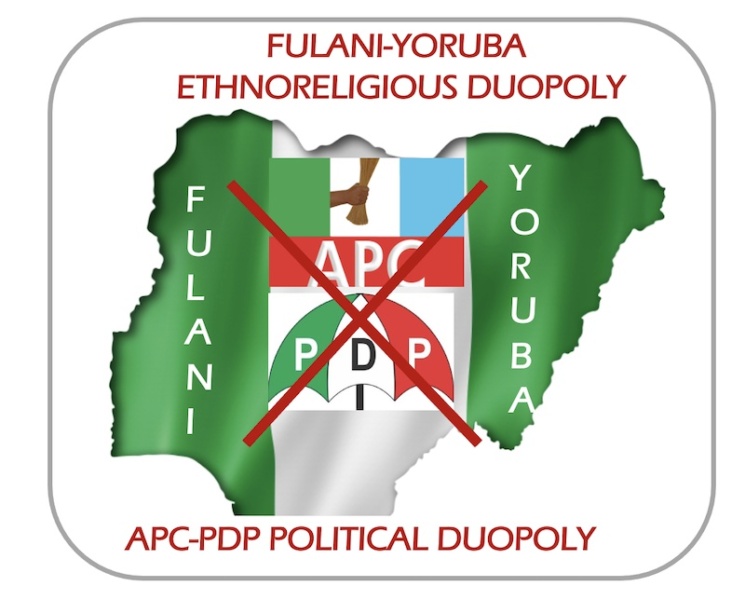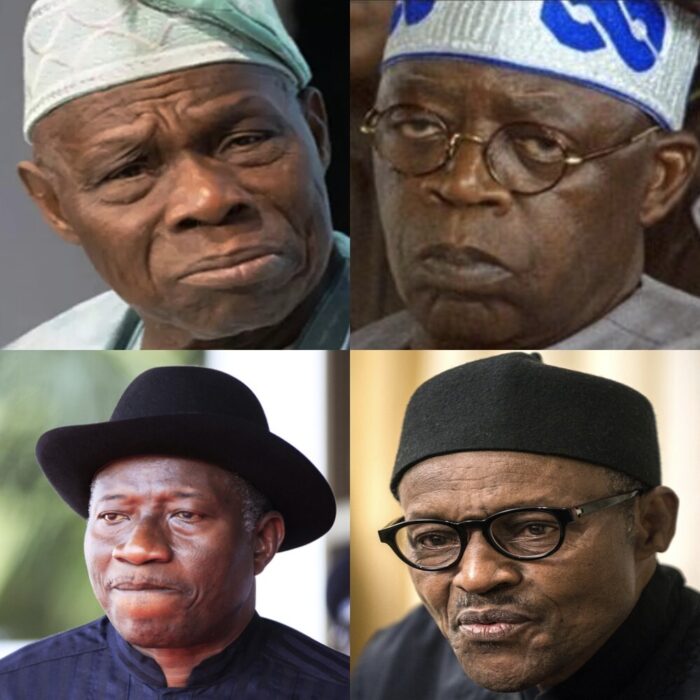By The Editorial Board
The current state of politics in Nigeria is a cause for concern for many citizens who are increasingly fed-up with the political malpractices and abysmal performance of the All Progressives Congress (APC) and the People’s Democratic Party (PDP) parties’ presidents over the past decades.
Until recently, the dominance of the Fulani and Yoruba ethnic groups in the two-party system has stifled political competition from emerging parties, resulting in limited options for the voting public. We refer to this phenomenon as the “Double Duopoly” — the Fulani-Yoruba ethnoreligious duopoly and the APC-PDP political duopoly — a twin system that has been intentionally designed and continuously optimized to dominate and control Nigeria’s political and economic markets for the benefit of these ethnic groups and their religious, business and cultural elites.
In the grandest sense, the Fulani and Yoruba ethnic groups have formed an alliance of domination in Nigeria’s political and economic systems. Over the past decades, since the end of the Biafra conflict, this alliance has systematically carved out and executed the redistribution of political and economic power to consolidate their dominance. Initially, the post-war alliance known as the Lagos Protocol was developed as a containment strategy to de-power and weaken the Igbo people politically and economically, to exclude the Igbos from presidential power to ensure they will not have the resources and political power to wedge another war.
In effect, the Lagos Protocol closed the door on any Igbo aspirant seeking the presidency, permanently excluding the Igbos from the highest office in the land on the platform of the APC and PDP parties. The Lagos Protocol is still alive, for all intents and purposes, even after fifty-three years of relative peaceful coexistence.
With control over the federal government and all levers of power that shape national security, freedom, the economy, resource allocation, business opportunities, and social behavior, the double duopoly implements political agendas that favor the alliance at the expense of other groups in the union called Nigeria.
Since the inception of representative democracy in Nigeria, both the APC and PDP have misruled and devastated the nation’s fortunes, resulting in immense suffering for millions of impoverished Nigerians who have paid the ultimate price with their lives.
Fifty-plus years of political domination by the double duopoly has not brought the hoped-for solution to the pervasive problems of poverty, illiteracy, inflation, unemployment, and political corruption in Nigeria. The economy is in dire straits, with unemployment and inflation reaching record highs, and an increasing number of Nigerians living in abject poverty while a small elite controls over 90% of the nation’s oil-generated wealth, according to Oxfam. Many Nigerian children go to bed hungry every night, and over 71 million parents are unsure of where their next meal will come from, despite the country’s abundant oil resources.
Therefore, combined as it is, the Fulani-Yoruba ethnoreligious duopoly and the APC-PDP political duopoly represent a grave political evil that must be dismantled for democracy to truly work in Nigeria. It does not serve the best interests of all Nigerians and prevents equal participation of all citizens in elections to select their leaders, posing an existential threat to the unity of the nation and the functioning of democracy.
In a functioning democracy, when established political parties fail to deliver on the needs of the citizens, new and innovative parties should be able to enter the political landscape with fresh visions and agendas to improve the lives of the people.
However, the hegemonic Fulani-Yoruba ethnoreligious duopoly and the APC-PDP political duopoly have made such competition impossible. This was evident in the 2023 election cycle, with the emergence of the Labour Party and its candidates, Peter Obi and Datti Baba-Ahmed (Obi-Datti), who offered novel and pragmatic solutions to Nigeria’s problems. However, the election was allegedly rigged in favor of the ruling APC, through INEC, thus stifling the potential for positive change. This is not democracy.
The Double Duopoly Is Killing Democracy In Nigeria
Democracy, at its core, thrives when all qualified citizens are free to exercise their rights to run for office and vote without fear of intimidation, coercion, or violence, and when their votes are accurately counted and reported. However, by intentionally excluding some Nigerians, especially the Igbos, from running for the presidency on the APC and PDP party platforms, Nigeria’s democracy faces a growing and dangerous threat from the malignant political duopoly of the Fulani and Yoruba ethnic groups.
What makes this double duopoly a democracy-killer is that voters now cast their votes for the party, rather than the candidate’s character, competence and their policies. According to exit polls from the 2023 presidential election, a staggering 70% of voters in the North voted for the logos of the APC or the PDP, rather than for individual candidates like Tinubu or Atiku.
Furthermore, the Fulani and Yoruba ethnic groups, which now dominate the political and economic landscape of Nigeria, have used intentional political gerrymandering to consolidate their power. They control a majority of the states, giving them a significant advantage in presidential elections. Religion and ethnicity have also been integrated into politics, shaping religious presence and tribal preference in the political system and further influencing voting patterns along ethnoreligious lines.
It is not surprising that this double duopoly, which to date, is designed to guarantee the election of either a Fulani or Yoruba president, lacks accountability to the citizens and does not serve the interests of all Nigerians. Instead, it has created and perpetuated a permanent ethnoreligious majority of Fulanis and Yorubas, with a permanent minority of Igbos and other minority outgroups.
This domination by the double duopoly, fueled by a spirit of revenge and marginalization of the Igbos and other ethnic minorities, has led to the erosion of democratic principles in elections, including the 2023 presidential and governorship elections.
Over the decades, the duopoly has divided the spoils of power, entrenching partisan advantage and using government funds to build party infrastructure in all the states to maintain its grip on power. This has given the APC and the PDP enormous economies of scale, with state-level and local government level staff to run campaigns in hundreds of localities. This advantage is unmerited and dangerous to democracy.
Newcomers like the Labour Party and NNPP, who lack the necessary resources to compete, are systematically disadvantaged in the majority of states, even when they are competitive. The duopoly’s power brokers in INEC have been accused of disadvantaging newcomers, as alleged in the 2023 elections.
Despite the challenges posed by the INEC and the double duopoly, the Obi-Datti team under the Labour Party performed admirably in the presidential election, which is a testament to the power of their agenda to solve the nation’s pressing problems and the growing dissatisfaction of the voting public with the undue political dominance of the APC and PDP and the Fulani-Yoruba hegemony. If Nigerian courts are truly independent, fair and impartial, and base their upcoming presidential election decision on the law and the facts of the petition filed by Obi-Datti, it is highly likely that Tinubu’s certificate of return will be nullified. This outcome will be a big win for democracy.
The Menace of the Fulani-Yoruba Hegemonic Ambition
Out of the fourteen (14) military and civilian heads of state Nigeria has had since August 1966, only two — Johnson Thomas Umunnakwe Aguiyi-Ironsi and Goodluck Jonathan — were not of Fulani-Hausa or Yoruba ethnic background. The North has produced nine (9), and the Yorubas have produced three (3), with the potential for a fourth if Tinubu wins in the courts. Notice that 12 of the 14 (or 86%) of the heads of state are members of the Fulani-Yoruba hegemony. Also, all elected presidents since the Fourth Republic are members of the APC-PDP political duopoly.
For almost four decades since the Second Republic, which began with the 1979 Constitution, neither the Igbos nor other minority groups have produced a single president, with Jonathan’s ascension to power being accidental due to President Yar’Adua’s untimely death.
Still the duopoly is united in its opposition to fresh political ideas, but otherwise lacks any genuine intention to address the nation’s complex and wicked problems that they themselves have contributed to creating.
The risks and flaws of this double duopoly system were once again evident in the 2023 presidential election, with the nomination and election of candidates who may not necessarily be the best choice for the country. In the elections, the INEC, which underpins this system, has been accused of systematic rigging to favor candidates from the double duopoly, posing a threat to the unity and survival of the nation. It is clear that the double duopoly is a menace and must be broken in order to foster a healthy democracy.
What Nigeria Should Do To Break The Double Duopoly
To break the duopoly and promote the emergence of third-party candidates, electoral reforms such as open primaries and ranked choice voting (RCV) could be considered. Open primaries would allow anyone to run for office without requiring party affiliation, and the top three vote-getters would advance to the general election. Ranked choice voting would allow voters to rank their choices, providing a more nuanced and democratic approach to elections. New Zealand, Australia and several states in the USA have successfully implemented RCV and it works. Any limitations of RCV pale in comparison to what exists today in Nigeria’s election process.
In conclusion, Nigeria’s double duopoly in politics has its origins in the post-Biafra war era and the desire to weaken the Igbos politically and economically. It’s time to dismantle this backward-looking and dangerous legacy policy. The APC and PDP, as the dominant political parties, have maintained their grip on power through various means, including structural advantage in the number of states and LGAs in the North and Southwest compared to the minority states, political corruption and election malfeasance. Electoral reforms, such as open primaries and ranked choice voting, could provide an opportunity for Nigerian voters to break the double duopoly and promote a more inclusive and democratic political landscape.



